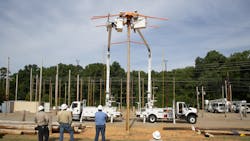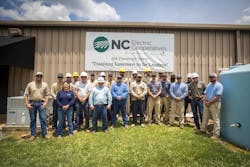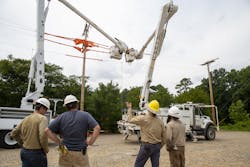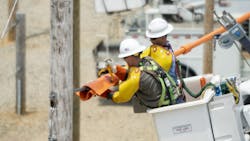Energized Training in a Safe, Controlled Environment
The instructors travel from their home cooperatives to a training facility on the grounds of Nash Community College in Rocky Mount, North Carolina. Recently, the association elevated existing training by energizing the overhead lines through the Timpson Training Panel system, which provides real-world experience in a safe environment. They are the first cooperative association in the country to install this technology and are currently training students from across the state.
Learning the Trade
At the community college, students can learn the skills of the line trade by practicing in the overhead pole yard, underground simulated area and a training substation. Since 1998, N.C. Electric Cooperatives have been partnering with Nash Community College, which operates the Lineman Training Academy. Through the Nash Community College 12-week program, the students can learn the basics of line work and get their foot into the door in the electric utility industry.
While the community college focuses on training up-and-coming lineworkers, the co-op schools train apprentice and journeymen lineworkers who are already employed by North Carolina electric cooperatives. When the apprentices top out as journeymen from the cooperative program, they earn not only a state apprenticeship card, but also a federal apprenticeship card through the Department of Labor.
This year, the association will train more than 500 students at 16 different week-long classes offered throughout the year. To meet the scheduling needs of the students, facilitators are repeating some sessions multiple times, meaning that the cooperatives will host a total of 26 schools in 2022.
Participating lineworkers typically enroll in two or three schools a year, and it takes four to five years to complete all the training sessions. The training requirements are up to each individual cooperative, but many tie the training sessions into lineworkers’ job descriptions.
Installing the Technology
Back in 2019, the cooperatives were searching for a way to raise the bar in training from simulated “work like it’s hot” scenarios to energized, three phase circuit work in a controlled and safe manner. After doing research by reading trade magazines and attending conferences, they discovered the Timpson Training Panel.
This control panel allows facilities to safely energize the overhead field and monitor the condition of the lines with sensitive redundant relay systems and interruption capabilities that carry a Safety Integrity Level of 3. The panel, which was designed to operate and offer protection similarly to a residential GFCI receptacle, allows lineworkers to train at full voltage while mitigating the risk to them.
To vet the equipment and its application, engineers from distribution cooperatives in the state researched the technical side of the panel’s operation. The Job Training and Safety team from North Carolina’s Electric Cooperatives visited the manufacturing facility and an actual training yard. Observing the equipment in action at a training facility was key to the decision process.
In 2020, the statewide board granted approval to purchase and install the training system. Following COVID-related delays, the co-ops installed the unit and got it up and running in 2021. The team installed the 6-ft tall, 6-ft wide by 2 ft deep unit in an exterior 10 ft by 20 ft building. While the unit is waterproof, it was installed inside a building to secure it and keep it safe from severe weather conditions.
Training with the equipment began in 2022. The cooperatives’ Job Training and Safety team first offered a training session for the instructors, who are seasoned journeymen, so they would be familiar with the equipment and the process. After demonstrating the equipment and answering questions, the instructors and association safety team discussed expectations moving forward about the training system and how it could benefit trainees.
The first session for students brought in 20 lineworkers from 10 cooperatives across North Carolina to train using the technology. Due to the popularity of the class, the cooperatives will offer the same class three different times this year. At each session, the student-to-teacher ratio is limited to give the participants more one-on-one instruction.
Practicing on an Energized Line
At the first school using the Timpson panel, the students came for a half a day of training on Monday and Friday and a full day on Tuesday, Wednesday and Thursday. At the beginning of each day, the instructors verified who was on the field, and they notified everyone that they were going to energize the line. Each day kicked off with a safety briefing to make the apprentices aware that they were going out to an energized training field and must follow all safety protocols.
When they turned the unit on, the system did a self-check. An alarm sounded and a red beacon lit up, which indicated the field was energized. Following the safety briefing, the instructors described how the equipment operates. The students then inspected their safety equipment and got to work. As in years past, they rotated through stations to complete several different tasks; however, instead of simulated energized training, the lines were energized.
Working in small groups, the apprentices performed the tasks assigned to them under strict supervision and observation. One of the students served as a designated observer for training purposes.
The participants, who all had at least two years of experience as lineworkers, were just starting to learn how to do bucket work at their cooperatives. Instructors expanded on these skills by requiring cross-arm change-outs and three-phase maintenance and construction work. The students all wear their personal protective equipment when training, as they would on the job.
Some of the students had experience working on energized single-phase lines back at their cooperatives, and when the system was turned on and they went up in the bucket at the training yard at the community college, they could tell the line had voltage on it. By providing true three-phase training, the co-ops are creating a real-world environment at the schools and enhancing the level of training beyond supervised energized on-the-job training that early-career lineworkers receive at their cooperatives.
This energized training had a significant impact on the students, who liked having the opportunity to go beyond simulation. In particular, they appreciated how the energized line required them to slow down and focus on not only the line work, but also the guidance from their instructors and communications with their fellow lineworkers.
“This is by far the best school I have gone to,” said one student. “The fact that it was ‘hot’ and we could work it hot just like real life on the job has stepped up training for us.”
Even though they were training in a safe and controlled environment, none of the apprentices wanted to be the one to knock the line out. If one of the students makes a mistake, the alarm will sound, the light will go off and the unit will shut down—giving the apprentices instant feedback that an error has been made. If the line is knocked out, then the exposure will be limited to 1.5 mA, and the system will shut down within about 20 milliseconds. The instructors plan to use any instances when contact with the line is made as teaching moments to investigate why the line was knocked out and how it could have been prevented. Following the safety briefing, the instructors will then reenergize the field and the apprentices will go back to work.
The implementation of energized training at the schools has also opened opportunities as new crew leaders join cooperative teams. In the future, the association plans to create a safety workshop for crew leaders to teach them about proper and effective coverup, which will help them in supervising and coaching lineworkers doing energized work out in the field back home.
Future plans also include building a new line to train the students about transformer banking, allowing apprentices to practice checking voltage and rotation and verify that they have wired the transformers correctly.
Through the Timpson Training Panel, the instructors can take training to the next level and elevate safety back at their own cooperatives. The students can also have a real-world experience with energized work in a safe training environment. This system changes the mindset of trainees and is an important and impactful investment in the workers in the field that will pay dividends over time.
With the technology, North Carolina’s electric cooperatives have elevated training to closely mirror a real-world environment. The goal is to provide value to all training in an effort to raise the lineworkers’ knowledge and skill levels and enhance safety across cooperative systems. The implementation of this project supports this mission.
Farris Leonard ([email protected]) is the director of job training and safety field services at the North Carolina’s Electric Cooperatives in Raleigh, North Carolina. He manages job training and coordinates safety programs.
About the Author
Farris Leonard
Farris Leonard ([email protected]) is the director of job training and safety field services at the North Carolina’s Electric Cooperatives in Raleigh, North Carolina. He manages job training and coordinates safety programs.



